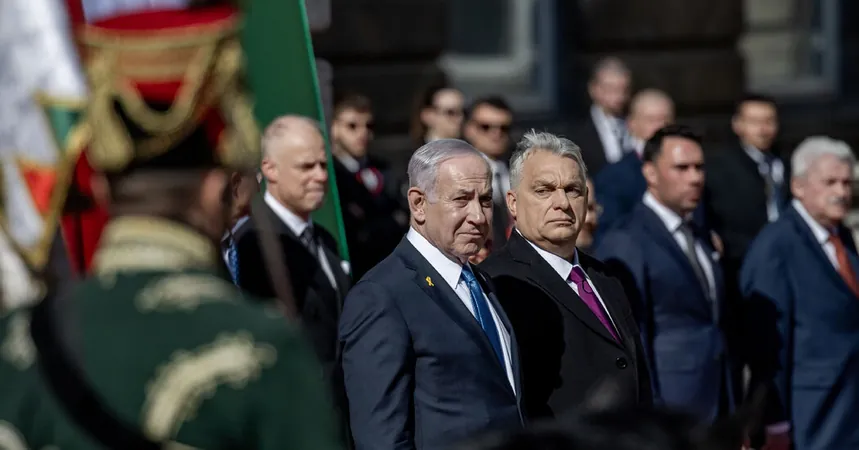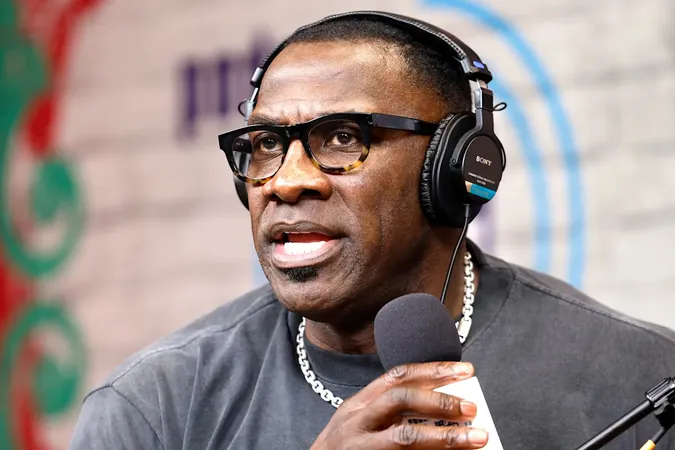
Accused War Criminal on the Red Carpet: The I.C.C. Under Scrutiny
2025-04-08
Author: Jessica Wong
In a striking moment that has raised eyebrows worldwide, Israeli Prime Minister Benjamin Netanyahu received a red-carpet welcome from Hungary, a nation known for its controversial political stance within Europe. This invitation came on the heels of an arrest warrant issued by the International Criminal Court (I.C.C.) last November, accusing Netanyahu's government of war crimes and crimes against humanity in Gaza.
Prime Minister Viktor Orban of Hungary is not just showcasing hospitality; his decision to welcome Netanyahu unequivocally sends a message of defiance against international norms. This was further emphasized when Orban announced Hungary’s withdrawal from the I.C.C. mere hours after Netanyahu’s arrival, indicating a deliberate stance against the court's authority.
Experts argue that the entwined political dynamics between Orban, Netanyahu, and former President Donald Trump reveal a broader trend in which political leaders prioritize national agendas over international legal frameworks. The I.C.C. represents an ambitious attempt at a global judicial system to uphold human rights, but it has become a target of disdain for populist leaders who see it as an obstacle to their sovereignty and agendas.
Orban's actions are a clear signal to both allies and critics alike. He’s positioning Hungary as a nation that will operate independently from the European Union, open for partnerships with countries like Russia and China. This not only appeals to nationalistic sentiments among his supporters but also seeks to attract foreign investments by touting Hungary as an unapologetic “free spirit” in the EU.
"This defiance isn't just about Israel; it’s about asserting Hungary's global position and tapping into the broader currents of nationalism that have been rising worldwide," says Ivan Krastev, a renowned political analyst. “Orban is playing an outrageous game of diplomatic poker, aligning with those who challenge the established international order.”
The parallels between Orban and other leaders like Netanyahu and Trump are striking. Both Orban and Netanyahu have faced significant judicial challenges at home, which they argue undermine their political power. They contend that the judiciary has overstepped its authority and does not reflect the societal diversity they represent. This shared narrative creates a bond among them, demonstrating how populist leaders utilize judicial conflicts to solidify their bases and rally support.
Notably, Orban's recent embrace of Netanyahu could set a troubling precedence that extends beyond their bilateral relations. Observers speculate that this could pave the way for further controversial visits from leaders under international scrutiny, such as Russian President Vladimir Putin, creating a diplomatic landscape where violations of international law may go unchecked.
Orban’s long-term vision for Hungary appears to dismiss traditional alliances and frameworks that have governed international relations for decades. He asserted in a speech last summer that the center of future global dynamics would shift towards Asia, rejecting ordains from Western powers, including the U.S. and EU. His commentary on not joining coalitions against perceived Eastern aggressions only underscores the geopolitics at play.
As China strengthens ties with Hungary, offering significant investments and opportunities, the landscape of European politics is rapidly changing. This evolving relationship poses critical questions regarding the future of international law and the norms that govern state behavior on the global stage.
Understanding these dynamics is paramount as the I.C.C. continues to face challenges in enforcing accountability, not just for Netanyahu, but for any leader moving forward. How the global community responds to such blatant defiance will signal whether the foundational principles of international justice remain intact or if they have become relics of a bygone era.



 Brasil (PT)
Brasil (PT)
 Canada (EN)
Canada (EN)
 Chile (ES)
Chile (ES)
 Česko (CS)
Česko (CS)
 대한민국 (KO)
대한민국 (KO)
 España (ES)
España (ES)
 France (FR)
France (FR)
 Hong Kong (EN)
Hong Kong (EN)
 Italia (IT)
Italia (IT)
 日本 (JA)
日本 (JA)
 Magyarország (HU)
Magyarország (HU)
 Norge (NO)
Norge (NO)
 Polska (PL)
Polska (PL)
 Schweiz (DE)
Schweiz (DE)
 Singapore (EN)
Singapore (EN)
 Sverige (SV)
Sverige (SV)
 Suomi (FI)
Suomi (FI)
 Türkiye (TR)
Türkiye (TR)
 الإمارات العربية المتحدة (AR)
الإمارات العربية المتحدة (AR)